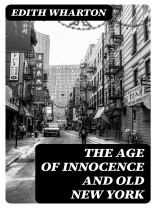Edith Wharton’s ‘The Age of Innocence’ offers a meticulous exploration of the constraints of societal norms in Gilded Age New York, deftly illustrating the interplay between individual desires and the rigid expectations of upper-class society. Wharton employs a rich, descriptive prose style that captures the opulence and stagnation of the era, creating a vivid tableau of characters navigating their fates within an intricate web of tradition and propriety. The novel’s exploration of themes such as love, hypocrisy, and the struggle for authenticity in a conformist society resonates deeply, situating it within the canon of American realism, while also reflecting the author’s incisive observations of her own social milieu. Edith Wharton, a Pulitzer Prize-winning novelist, was born into the very society she critiques, providing her an intimate understanding of its mores and artistry. Her own experiences as a member of Old New York’s elite, coupled with her desire to break free from such restrictive conventions, are the impetus behind this work. Wharton was profoundly interested in the moral conflicts arising from the human experience, which is why she so compellingly illustrates the dualities of aspiration and obligation. Readers seeking a profound and poignant examination of societal expectations and personal sacrifice will find ‘The Age of Innocence’ to be an enlightening engagement with both the historical and the timeless. Wharton’s masterful storytelling invites reflection on the complexities of love and duty, making it an essential read for anyone interested in the intersection of personal and social identity.
Sobre o autor
Edith Wharton (1862-1937), an eminent American novelist of the early 20th century, distinguished herself not just by the sophistication of her writing but also by the astute criticism of the aristocratic society she was part of. Born Edith Newbold Jones into a wealthy New York family, her lived experience within the Gilded Age upper class provided fertile ground for her narratives, which often explored the ironies and burdens of social conventions and expectations. Wharton’s writing is characterized by its piercing social commentary and well-crafted prose. Her Pulitzer Prize-winning novel ‘The Age of Innocence’ (1920) is regarded as an incisive critique of New York high society during the 1870s. Similarly, ‘Old New York’ (1924) is a collection of novellas that reflects her interest in the history and morals of the city’s elite during the last half of the 19th century. Wharton’s literary style, both elegant and incisive, established her as a central figure in American literature. Her mastery in combining the psychological with the social allows her books to transcend the era they depict, resonating with readers long after their publication. Wharton’s work continues to be studied and appreciated for its narrative technique, depiction of character, and her nuanced understanding of the social mores of her time.












